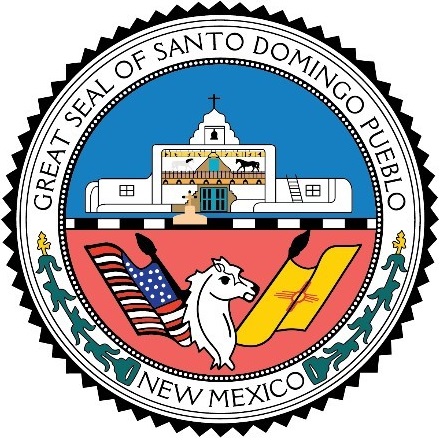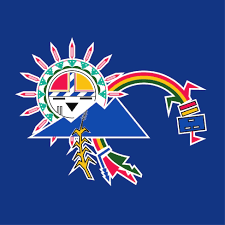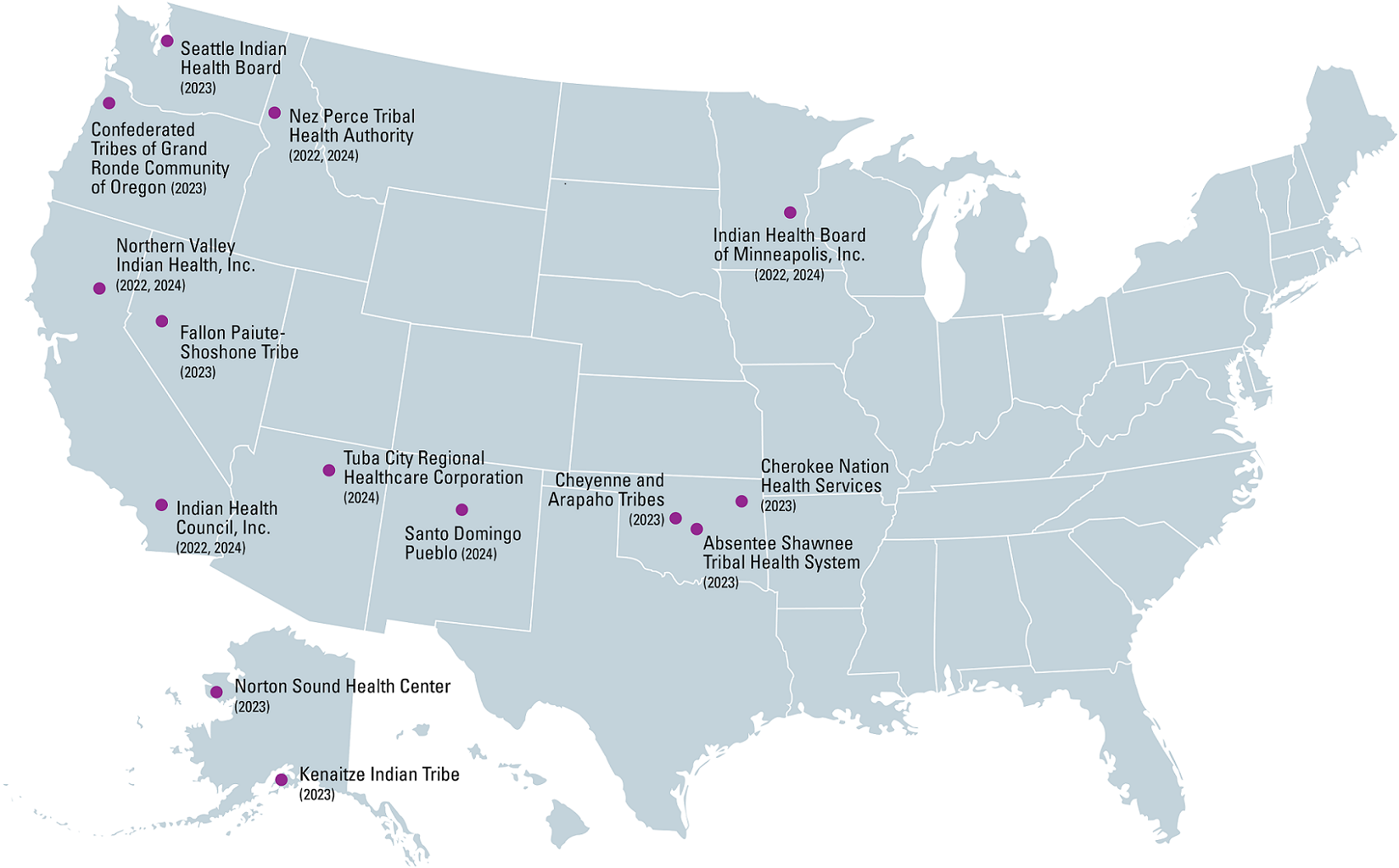Dementia Models of Care Grantees
Grantee Map
Map Showing Grantees Across the U.S by First Year of Award
- Alaska Area: Norton Sound Health Center (2023) and Kenaitze Indian Tribe (2023)
- Portland Area: Seattle Indian Health Board (2023), Confederated Tribes of Grand Ronde Community of Oregon (2023), and Nez Perce Tribal Health Authority (2022, 2024)
- California Area: Northern Valley Indian Health (2022, 2024) and Indian Health Council (2022, 2024)
- Phoenix Area: Fallon Paiute-Shoshone Tribe (2023) and Tuba City Regional Health Corporation (2024)
- Albuquerque Area: Santo Domingo Pueblo (2024)
- Oklahoma Area: Cheyenne and Arapaho Tribes (2023), Absentee Shawnee Tribal Health System (2023), and Cherokee Nation Health Services (2023)
- Bemidji Area: Indian Health Board of Minneapolis (2022, 2024)
Note: 2022 and 2023 grantees received two years of funding. 2024 grantees received three years of funding.
Grantees by Year

Indian Health Board of Minneapolis, Inc. (Bemidji Area) is providing holistic care and expanding community education on dementia while integrating traditional practices into urban Indian medical care models. This includes:
- Increasing access to earlier dementia diagnosis
- Focusing on physical, emotional, and spiritual support
- Improving the interdisciplinary assessment and care planning process
- Supporting care plans that reflect cultural values and beliefs for caregivers and people with dementia

Indian Health Council, Inc. (California Area) is enhancing care coordination and increasing community outreach efforts for the consortium of nine tribes served by the clinic. This includes:
- Integrated care model expansion
- Increasing community outreach and education through the Cognitive Health and Wellness Program
- Developing culturally sensitive care plans tailored to individuals
- Providing caregiver resources and support groups

Nez Perce Tribal Health Authority (Portland Area) is advancing culturally relevant dementia care by building stronger support systems for both patients and caregivers served by its Nimiipuu Health primary care clinic. This includes:
- Enhancing culturally appropriate care practices
- Strengthening caregiver support networks
- Developing educational materials with traditional knowledge
- Training providers in culturally sensitive care

The Northern Valley Indian Health, Inc. (California Area) Community Health and Outreach program is strengthening support networks and clinical services for dementia patients. This includes:
- Enhancing care coordination within the community
- Improving care coordination between providers and community services
- Training staff on dementia care best practices
- Expanding access to diagnostic services for early detection

Santo Domingo Pueblo (Albuquerque Area) is improving dementia care through community-led initiatives that will bridge gaps in cognitive care and services. This includes:
- Creating educational programs for early detection and treatment
- Integrating traditional practices and knowledge into dementia care programs
- Training community members to provide in-home dementia care and support
- Providing comprehensive caregiver support

Tuba City Regional Healthcare Corporation (Phoenix Area) is expanding its comprehensive care program for dementia patients and their caregivers to help improve access to specialized services, currently housed in the Neurology department. This includes:
- Building community-clinical linkages
- Focusing on access to specialized dementia services in rural areas
- Increasing caregiver support services, including respite care
- Implementing community outreach to raise dementia awareness

Absentee Shawnee Tribal Health System (Oklahoma City Area) is improving its patient-focused dementia care for rural, non-reservation American Indian communities. This includes:
- Creating culturally tailored treatment
- Expanding dementia care services
- Reducing symptoms for tribal elders
- Improving caregiver well-being
- Lowering health care costs

Cherokee Nation Health Services (Oklahoma City Area) is using grant funds to hire a patient services advocate. This advocate improves overall dementia care by:
- Giving dedicated support to patients and caregivers
- Coordinating outreach efforts
- Raising awareness and promoting early diagnosis
- Providing educational resources
- Building community partnerships to help those affected by dementia

The Cheyenne and Arapaho Tribes (Oklahoma City Area) is starting a new program to improve dementia support for tribal members. This program offers:
- Assessments
- Support for caregivers
- Training for the Healthy Aging Team
- Opportunities to gather data on cognitive problems

The Confederated Tribes of Grand Ronde Community of Oregon (Portland Area) is starting a comprehensive, culturally tailored dementia program to meet the increasing needs of its community. This program focuses on:
- Early detection
- Supporting caregivers
- Promoting holistic wellness

The Fallon Paiute-Shoshone Tribe (Phoenix Area) is guided by a Dementia Care Steering Committee with members from various tribal health organizations, and is promoting public education and creating caregiver support groups. The tribe is hiring a dementia care specialist to:
- Assess how common dementia is in the tribe's service area
- Identify gaps in care
- Introduce a culturally relevant, community-based approach

The Kenaitze Indian Tribe (Alaska Area) is introducing a comprehensive dementia care program for tribal elders. The program combines:
- Care from various providers
- Careful supervision
- A commitment to sharing insights

Norton Sound Health Center (Alaska Area) is hiring staff to coordinate patient assessments, referrals, and various team efforts. The center is focused on:
- Collaborating with regional tribal and community services
- Sharing best practices with IHS programs through the Alaska Native Tribal Health Consortium
- Exploring funding options, including a pilot program for respite care

Seattle Indian Health Board (Portland Area) is focused on improving culturally relevant, comprehensive dementia care for American Indian and Alaska Native people in Seattle/King County. The program focuses on:
- Traditional Indian medicine
- Knowledge-sharing among urban Indian groups
- Support for urban Native elders, caregivers, and health care providers

Indian Health Board of Minneapolis, Inc. (Bemidji Area) addressed dementia in the community by:
- Creating a culturally appropriate way to diagnose dementia
- Hiring a program manager and a community elder
- Working with community health workers to raise awareness about dementia

Indian Health Council, Inc. (California Area) took a multi-level approach to help people with dementia and their caregivers. It focused on early detection of dementia. It also used a case management system to:
- Deliver patient-centered care
- Monitor progress
- Support caregivers
- Provide timely access to specialized services

Nez Perce Tribal Health Authority (Portland Area), through Nimiipuu Health, made major efforts to address dementia within the community by:
- Educating tribal programs and clinical teams on how to recognize the signs of dementia
- Supporting elders and caregivers affected by dementia

Northern Valley Indian Health, Inc. (California Area) increased its support for those affected by dementia by:
- Hiring a program coordinator to oversee its Stronger Together Dementia Awareness Program
- Creating an early detection tool
- Developing individualized health plans to empower people living with dementia and their caregivers



